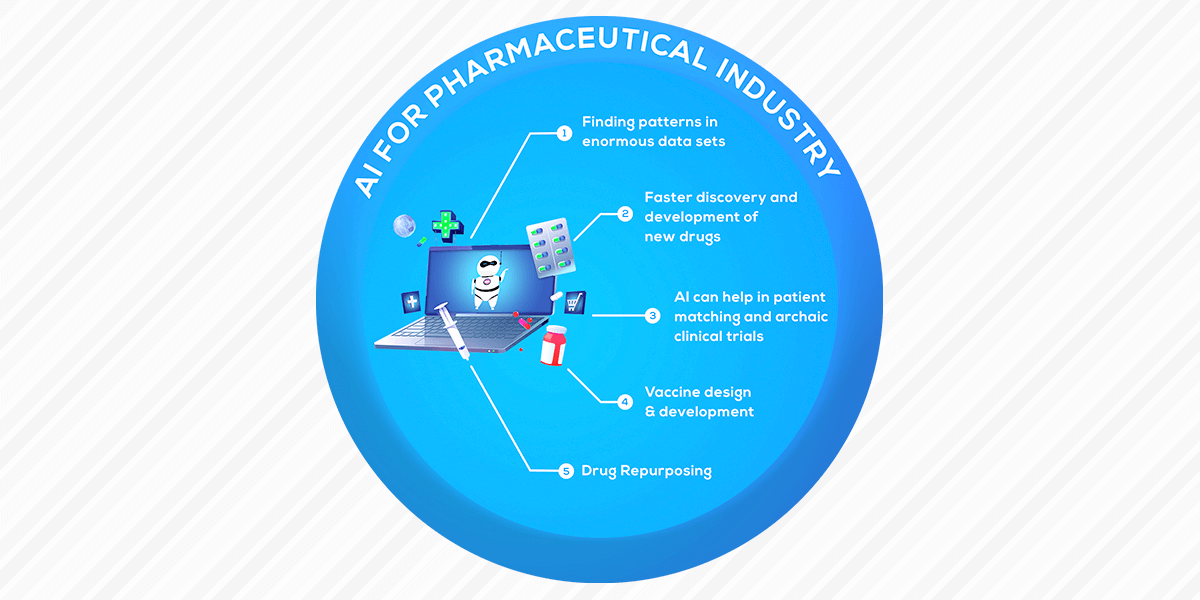Artificial intelligence technologies are setting their roots deeper into the pharmaceutical sector. AI is proving to be a game-changer in drug and vaccine discoveries from a time and cost perspective. 94% of pharmaceuticals believe that artificial intelligence, RPA, machine learning, and IoT will have multiple impacts on the industry in the coming future. 19% of pharmaceuticals say they are on the cusp of a revolution. There are 1000s of diseases with no treatment. AI provides breakthrough opportunities for researchers to employ AI technologies to find new treatments, drugs, and vaccines for diseases.

Let’s briefly go through the different application of AI for the pharmaceutical industry:
1- Finding patterns in enormous data sets:
There’s a massive amount of data available from various sources, such as clinical trials, research papers, patient records, and patents. Human intelligence cannot possibly analyze this volume of data to deduct accurate patterns. On the other hand, AI can effectively identify different entities and present their links with other things.
Atomwise is a company based in San Francisco which is utilizing the analytical ability of artificial intelligence to determine patterns and computing new treatments for multiple sclerosis.
2-Faster discovery and development of new drugs:
AI can help pharmaceutical companies to speed up clinical development and cut cost. Pharmaceutical companies spend 2.7 billion dollars for each drug that makes it to market and what that accounts for is that 90% of the drugs fail in clinical trials.
If we look at the drug development stages, following are the processes in which AI is being adopted:
- Identification process of drug targets
- Finding ways to improve different molecular reactions
Arpeggio biosciences, a Colorado-based startup, which is using machine learning to discover new drugs by aggregating and synthesizing data.
3- AI can help in patient matching and archaic clinical trials:
Finding a suitable candidate for a clinical trial is a critical obstacle in getting drugs to market. AI can mine medical records and find the right patients more quickly for clinical trials.
Deep6 AI uses natural language processing (NLP) software which is a subset of AI to find patients who match intricate trial requirements in no time.
4- Vaccine design & development:
Designing and development of vaccines take several years before finally reaching the market. It can be separated into two phases. First step is to find the right molecules set for the vaccine from countless possibilities. The second is half clinical trials for which suitable candidates are needed. AI can reduce the time, efforts, and cost of producing vaccines efficiently.
Since the dawn of the year 2020, the world is facing COVID 19 pandemic. Researchers are utilizing AI models to accelerate the vaccine designing process and relieving the world from the viral outbreak. Vaxine Pty Ltd, a biotech company based in South Australia, is working with Microsoft to develop its COVAX-19 vaccine using artificial intelligence-based technologies.
5-Drug Repurposing:
Drug repurposing has become more enticing and pragmatic with the advent of AI. Drug repurposing is the concept of using an existing therapeutic for a new disease which helps pharma companies in reducing cost.
IBM applies machine learning algorithms on large data sets with the assistance of ‘IBM Watson health’ to test drug candidates for repurposing in different areas.
Future Prospects
There is plenty of room for drug discovery and development. In the health sector, there is a push to personal medication which is looking at a patient’s genetic makeup and finding medicines specifically for their treatment. If we look at an example, such as the human genome project that was a huge feat for biologists.
Google’s deep variant has applied AI to build a picture of a patient’s genome from their DNA. What we can do with that is find different areas within the genetic code that are druggable. This offers a new target for large pharmaceuticals that are constantly looking to revamp the drug development pipeline. AI has the capacity to enable personalized medication in the near future. We need to explore the vast opportunities presented to us by AI to make the world a better place to live.

